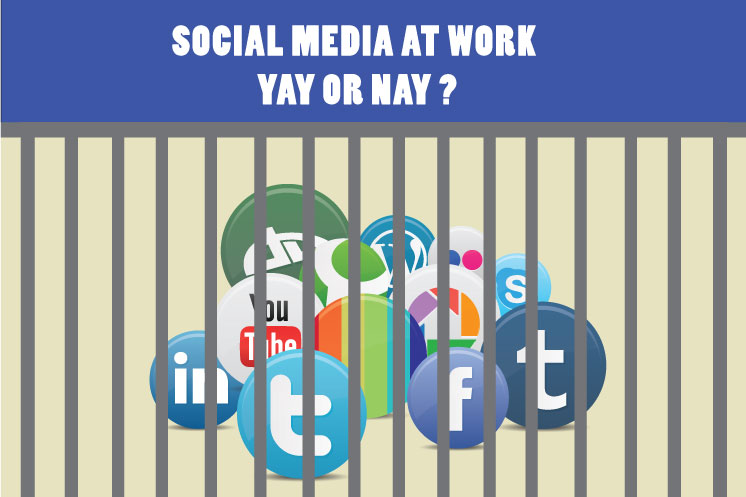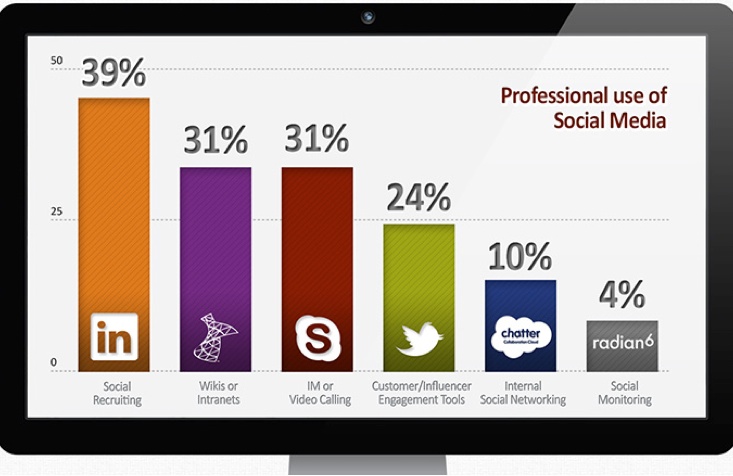
As social media grows in the GCC and the Arab world, many are now accessing their multiple social media accounts via their laptops, cell phones and tablets. These social media users are continuously growing in the Middle East, as Facebook users in the Arab world alone stands at 45,194,452 users, while the number of estimated number of active Twitter users in the Arab region has hit 2,099,706 users (as of June, 2012).
Also, LinkedIn users in the Arab world currently stand at 4,294,484 users (as of June, 2012), up from 3,588,215 users at the beginning of the February (Reports from Dubai School of Government). As these numbers multiply by the array variety of social media platforms, such as blogs, facebook, Twitter, LinkedIn, YouTube, Kik, Keek and many more, the adamant question is: Should we integrate the use of social media at work?
Many establishments up to this day have blocked social media websites at work, leaving their employees to access their personal social media from their mobile devices. Blocking, restricting or even monitoring the social media sites will not limit the employees from using their personal social media during work hours.
Companies can no longer ignore the use of social tools nor the ways the employees use them. These technologies can be used to create business value, share information, engage employees and create dialogue with customers and their prospects. Nowadays, social media can be the source of driving new ideas, tracking goals, contributing content, and getting acknowledgement from their customers, employees and prospects. Social networking sites can be used to drive innovation in their projects and help in the company’s growth in the future.
A recent incident in the UK has reported the sacking of 11 officials, amongst 116 DWP employees who have faced disciplinary action for blogging and social networking since January 2009, according to figures revealed under the Freedom of Information Act. Commented on this incident, Steven George-Hilley, the director of technology at right-leaning think-tank Parliament Street, said: “In a social media age, it beggars belief that employees are being banned from using sites like Twitter and Facebook in the workplace. Instead of implementing draconian rules and penalties, public sector departments should encourage responsible use of social media, that empowers staff without putting the organization’s credibility at risk (source: Guardian)”.
So what is the solution? Ownership. Companies should accept the social media networking sites and accept the fact that they can benefit from these sites whilst employees are with them. They can do that by developing a social media policy and offer social media training to them. Addressing the employees’ social media use while aligning their usage with the company’s goals and culture. An informed workforce, well trained in social media can better engage customers and become an online ambassadors of the organization.
Clear communication regarding social media have to be addressed rather than developing a complex written policy, tossing it at employees and expecting them to apply it. Companies should seek the help of their marketing department in creating and implementing the corporate social media policy with the use of their HR department as gatekeepers of this policy.

There is no “one size fits all” approach to developing a corporate social media policy. The business model and company culture are key considerations. Social media policies showed that certain industries, such as law, construction, or financial services have different requirements concerning compliance, privacy, and safety, for example. Rather than mistrusting employees, companies should move forward to implement best practices and training for social media use. At present, guesswork rather than clarity is the norm for social policy in many organizations.
So what are your thoughts on this subject? Do you use social media at work? If so, what for? What can your company do to accommodate employees and their use of social media better?




Not bad. I think everyone needs some time to breathe at work. There's nothing wrong with keeping the social networking sites open at work. In fact, employees will be more inclined to share 'work' news when they see it.
Sometimes organizations can have employees access social sites at a certain hour if they still feel the need to have it restricted. A company I know, opens their social media sites after 12PM where it is time for employees to almost go home after 4 hours, and maybe a chill a bit.
Blocking social media sites at work is not the solution to aid productivity levels. Especially in public sectors, i find it absurd that some organisations go as far blocking the internet from their employees!!
No one wants to come to work knowing that he has restrictions to abide by at this day and age where information technology (i.e the internet) is almost a right to every individual.
We are all adults and need to be wary of abusing the freedom to given to us. Excessive monitoring will only make the employee feel jailed, which in turn can result in low morale and absenteeism.
My boss made a good point the other day. He compared the time we spend on social media during work hours to the time we spend getting a cup of coffee or having a cigarette break or such.
Another point is whether being socially active will help you do a better job. That might be true for many types of jobs, particularly in the communications or protocol industries.
Good day! I simply wish to give a huge thumbs up for the nice data you might have here on this post.
I will probably be coming back to your blog for extra
soon.
Somebody necessarily lend a hand to make seriously posts I might state.
That is the first time I frequented your web page and to this point?
I surprised with the research you made to create this actual submit incredible.
Magnificent process!